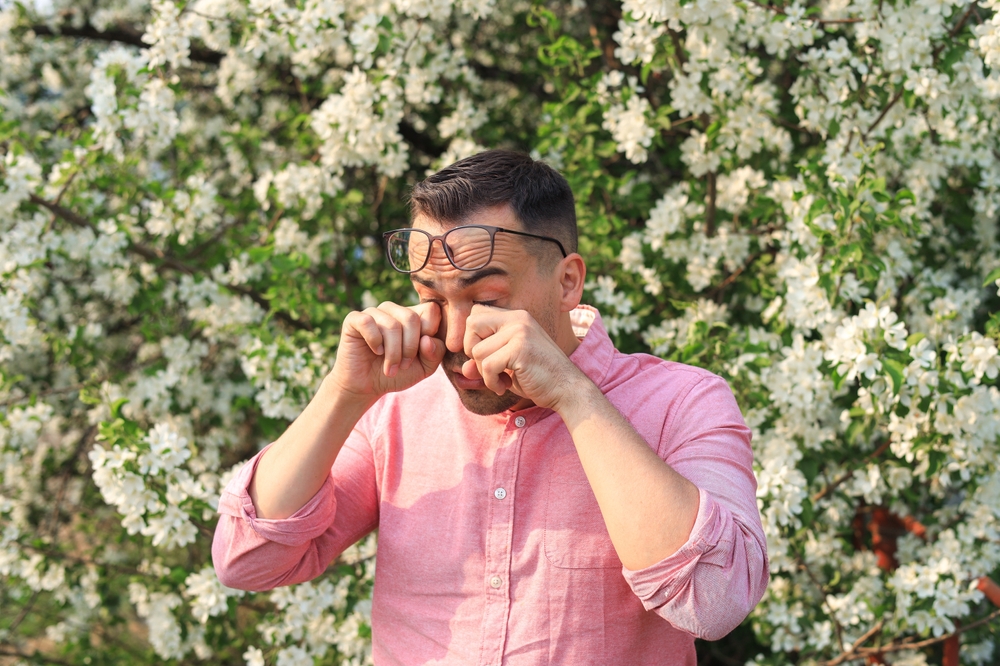
If you suffer from seasonal allergies, you’re not alone. For many people in the Dallas-Fort Worth area, the changing seasons bring more than just warmer weather—they bring itchy, red, and irritated eyes. While most people associate allergies with sneezing and a runny nose, eye-related symptoms are just as common and can greatly affect your quality of life.
If you’re struggling with symptoms of seasonal allergies, visiting your optometrist can provide relief and ensure that your eyes stay healthy. At Look Eyecare & Eyewear, we’re here to help patients in Coppell, Irving, and the entire DFW area manage their allergy-related eye problems with effective treatments.
Common Symptoms of Seasonal Allergies
Seasonal allergies, also known as allergic conjunctivitis, occur when allergens like pollen, dust, and mold spores irritate the eyes. These allergens trigger an immune response, causing a range of uncomfortable symptoms that can affect your vision and overall well-being. Common eye-related symptoms of seasonal allergies include:
Redness and Irritation: Your eyes may become red, swollen, and irritated due to inflammation.
Itchy Eyes: One of the most common symptoms, itchy eyes, can be incredibly frustrating and lead to excessive rubbing, which can worsen irritation.
Watery Eyes: The body often reacts to allergens by producing excess tears, causing your eyes to water frequently.
Burning Sensation: Many people experience a burning or stinging feeling in their eyes, especially after being exposed to outdoor allergens.
Blurred Vision: Irritation and excessive tearing can sometimes cause temporary blurred vision.
Swollen Eyelids: In more severe cases, the skin around your eyes, including the eyelids, can swell, leading to discomfort and a tired appearance.
What Triggers Seasonal Allergies?
In the Dallas-Fort Worth area, several environmental factors can contribute to seasonal eye allergies. Common allergens include:
Pollen from Trees, Grass, and Weeds: As plants release pollen during the spring, summer, and fall months, it becomes airborne and easily affects your eyes.
Mold Spores: Damp, humid conditions foster mold growth, which can release spores that trigger allergic reactions.
Dust Mites: Even though they are year-round allergens, dust mites can increase during certain times of the year, especially in the fall and winter months when homes are closed up to retain heat.
Animal Dander: Pets, while beloved members of the family, can also trigger allergies through their dander, especially during the shedding seasons.
Effective Treatments for Seasonal Allergies
The good news is that you don’t have to suffer through the symptoms of seasonal allergies! There are a variety of treatments available that can alleviate your discomfort and help you enjoy clear, healthy eyes again. Here are some common treatments your optometrist may recommend:
1. Over-the-Counter Eye Drops
Artificial tears or lubricating eye drops can help flush allergens from your eyes and soothe irritation. These are often recommended as a first-line defense against mild symptoms.
2. Prescription Allergy Eye Drops
If over-the-counter drops aren’t enough, your optometrist may prescribe stronger antihistamine or anti-inflammatory eye drops to reduce redness, itching, and swelling. These medications target the immune response, providing longer-lasting relief.
3. Oral Antihistamines
In some cases, oral antihistamines can help relieve allergy symptoms. While these medications can be effective, they may sometimes cause dry eyes, so it’s essential to consult with your optometrist about the best option for your condition.
4. Cold Compresses
A cold compress applied to the eyes can help reduce swelling and provide relief from itching. This simple at-home treatment can be especially useful during peak allergy season.
5. Allergen Avoidance Tips
Your optometrist may also provide guidance on minimizing exposure to allergens. This may include wearing sunglasses outdoors to shield your eyes from pollen, keeping windows closed during high pollen days, and using air purifiers at home to reduce airborne allergens.
Why You Should See Your Optometrist for Seasonal Allergy Relief
When it comes to eye health, your optometrist is your best resource for managing the symptoms of seasonal allergies. Here’s why it’s important to schedule a visit:
1. Proper Diagnosis
Eye allergies can sometimes mimic other conditions, such as dry eye syndrome or infections like conjunctivitis (pink eye). An optometrist can perform a comprehensive eye exam to determine whether your symptoms are truly caused by allergies or another underlying condition. Getting the right diagnosis is crucial for effective treatment.
2. Customized Treatment Plan
Your optometrist will develop a treatment plan tailored to your specific symptoms and lifestyle. Over-the-counter remedies might not be enough for everyone, and your optometrist can prescribe stronger medications or suggest alternative treatments to provide lasting relief.
3. Prevention of Complications
Chronic eye rubbing due to itching can lead to corneal damage or even infections. Seeing your optometrist can prevent complications by providing the right treatments and helping you avoid harmful habits like excessive rubbing.
4. Long-Term Eye Health
Allergies may seem like a temporary issue, but repeated irritation and inflammation can affect your long-term eye health. Your optometrist will monitor your eye health and make sure that allergies don’t lead to more serious problems like dry eye syndrome, infections, or other complications.
Conclusion
If you’re dealing with itchy, watery, and red eyes due to seasonal allergies, don’t wait for the symptoms to go away on their own. At Look Eyecare & Eyewear,, we’re here to help residents of Coppell, Irving, and the Dallas-Fort Worth area find relief from seasonal eye allergies with personalized treatment plans. Our expert team will diagnose your condition, recommend effective treatments, and ensure your eyes stay healthy all year round.
Contact us today to schedule your eye exam and get started on the path to clearer, more comfortable vision.







